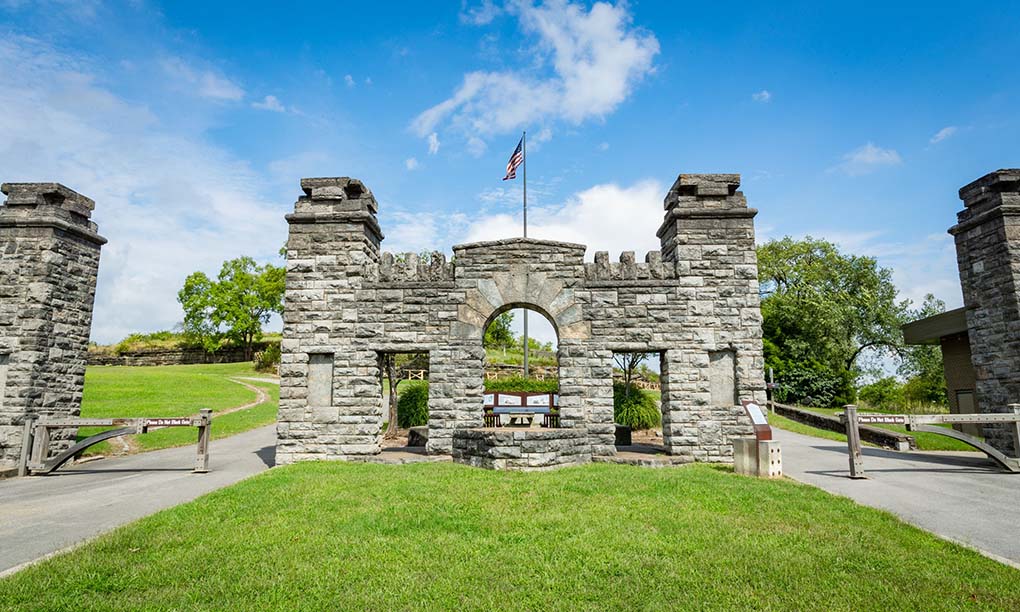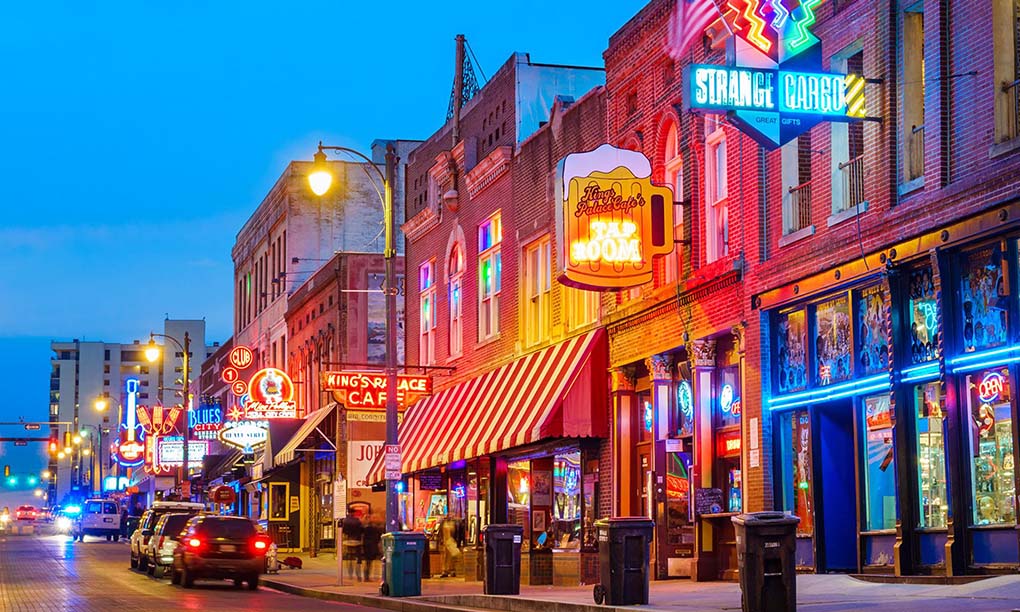Nashville, a city synonymous with the twang of country melodies, conceals a rich historical tapestry within its vibrant streets. My foray into the historical district of Nashville was an enchanting journey, where each cobblestone seemed to whisper stories of days gone by. I share my encounters and insights from three personally visited locales and propose four essential sites for any history enthusiast. From detailed accounts to practical advice, join me on a virtual tour unraveling the captivating history of Nashville.
The Hermitage: Residence of President Andrew Jackson
Nestled on the outskirts of Nashville, The Hermitage beckoned with promises of a vivid journey into the annals of history. This living memorial, dedicated to President Andrew Jackson, unfolded on a sprawling 1,120-acre estate, offering a captivating window into the antebellum South.
As I stepped onto the estate, the air seemed to carry whispers of a bygone era. The impeccably preserved mansion stood before me, a portal to the early 19th century. Embarking on the guided tour, I felt a profound connection with the tumultuous presidency of Andrew Jackson. The nuanced details of Southern life unfolded with each step, providing a rich tapestry of historical insights.
The meticulously landscaped gardens enveloped the estate, adorned with historical artifacts that echoed tales of a different time. Strolling through this botanical haven, I could almost envision the genteel gatherings and political discussions that once graced these hallowed grounds. The serene ambiance added a layer of tranquility to the immersive historical experience.
Location: 4580 Rachel’s Lane, Hermitage, TN 37076
Access: Easily reachable by car, a mere 20-minute drive from downtown Nashville.
Tickets: Priced at $24.00 for adults, with thoughtful concessions for seniors and children.
Booking: The journey into history begins with securing online reservations through The Hermitage website, ensuring both convenience and potential discounts.
Pros: The experience at The Hermitage offered a truly immersive dive into historical narratives, with picturesque grounds enhancing the overall ambiance.
Cons: However, it’s worth noting that the onsite dining options are somewhat limited, encouraging visitors to plan accordingly.
My visit to The Hermitage was more than a mere tour; it was a journey back in time, allowing me to walk in the footsteps of President Andrew Jackson. The meticulous preservation of the mansion, coupled with the serene beauty of the gardens, made for an unforgettable experience. While the limited dining options posed a minor inconvenience, the overall historical immersion at The Hermitage was undeniably worth the venture.
Fort Nashborough: A Peek into Frontier Life
Nestled along the banks of the Cumberland River, Fort Nashborough emerged as a living testament to the formative years of Nashville. This reconstructed fort, a beacon of historical preservation, vividly resurrected the challenges faced by settlers in the late 18th century.
Stepping through the entrance framed by sturdy log walls, I found myself instantly transported into an era echoing with the whispers of the past. The atmosphere within Fort Nashborough resonated with the trials and triumphs of early settlers. Knowledgeable guides, akin to storytellers of a bygone era, skillfully wove tales of survival, trade, and conflicts. Their narratives formed a captivating historical tapestry, bringing to life the struggles that shaped Nashville’s infancy.

The fort was not merely a static relic; it was a dynamic, interactive space. Engaging exhibits beckoned, allowing me to immerse myself in traditional frontier activities. From trying my hand at period-accurate tools to participating in activities reminiscent of daily life in the 18th century, each interactive element fostered a hands-on historical encounter. This unique engagement added a layer of authenticity to the overall exploration, making history come alive.
Location: 170 1st Ave N, Nashville, TN 37201
Access: Conveniently situated within walking distance from downtown Nashville, offering an easily accessible historical haven.
Tickets: Admission, remarkably, came free of charge, with the option for visitors to contribute voluntary donations.
Booking: Fort Nashborough operated on a refreshingly straightforward basis – no reservations required. Entry was granted on a first-come, first-served basis.
Pros: The most striking advantage was undoubtedly the free admission, allowing all to partake in this engaging educational experience. The knowledgeable guides and interactive exhibits added significant value to the historical exploration.
Cons: However, it’s essential to note the limitations, particularly during peak hours. The site, while rich in historical content, may face constraints in terms of amenities and accessibility during busy periods.
Fort Nashborough, with its robust reconstruction and immersive storytelling, proved to be more than a historical site – it was a journey through time. The interactive elements elevated the experience, offering a glimpse into the challenges and triumphs of Nashville’s early settlers. While the constraints during peak hours were apparent, they did little to diminish the overall historical richness that Fort Nashborough bestowed upon its visitors.
Ryman Auditorium: The Heart of Music City
Nestled in the beating heart of Nashville, Ryman Auditorium, affectionately known as the “Mother Church of Country Music,” stands as a testament to the city’s musical legacy, dating back to its establishment in 1892. Renowned for hosting legendary performances and serving as a former home of the Grand Ole Opry, Ryman Auditorium is a sacred pilgrimage site for fervent music enthusiasts.
Stepping through the hallowed doors of Ryman Auditorium was akin to stepping into a sanctuary of sound. The auditorium bore witness to countless iconic performances, and as I stood amidst its hallowed halls, I could almost feel the echoes of musical history reverberating through the air. The guided backstage tour proved to be an immersive journey into Ryman’s rich history, adorned with memorabilia from the most iconic names in music.
The acoustics of the auditorium were nothing short of awe-inspiring. Every note seemed to resonate with the essence of country music’s roots, creating an atmosphere that allowed for a genuine appreciation of the art form. The historical significance of the venue combined with the magical acoustics created an experience that transcended the ordinary, immersing me in the soul-stirring melodies that had graced the auditorium for over a century.
Location: 116 5th Ave N, Nashville, TN 37219
Access: Centrally located in downtown Nashville, offering easy accessibility on foot or by public transportation.
Tickets: Tour prices varied, and I recommend checking the official website for the most up-to-date rates and available tour options.
Booking: Given the popularity of Ryman Auditorium, advance booking was advisable, particularly during peak tourist seasons, to secure a spot on the guided tours.
Pros: Ryman Auditorium delivered an unparalleled immersion into the history of country music, with guided tours that were both educational and captivating. The auditorium’s acoustics added a layer of enchantment to the overall experience.
Cons: However, it’s important to note that the ticket prices were relatively higher compared to some other attractions. The premium cost, though, seemed justified by the unique musical pilgrimage that Ryman offered.
Ryman Auditorium, with its rich history and soulful acoustics, is more than a venue – it’s a living testament to the soul of Nashville’s music. The guided tour and the immersive experience within the auditorium allowed me to trace the footsteps of musical legends and understand the evolution of country music. While the ticket prices might be considered a drawback, the profound musical journey Ryman facilitates is undeniably worth the investment.
Recommendations: Must-Visit Historical Gems
Belle Meade Plantation: Antebellum Elegance
Belle Meade Plantation, standing as a symbol of Southern grandeur, beckons visitors into a world of antebellum elegance, providing a captivating glimpse into the opulent lifestyle of the Old South. This meticulously preserved estate, comprised of a stately mansion and expansive grounds, weaves together a narrative rich in history and charm.
The heart of Belle Meade is undoubtedly the mansion, a testament to the architectural and aesthetic grandeur of the Old South. Stepping into its hallowed halls, visitors are transported back in time, surrounded by period-accurate furnishings and décor. Each room tells a story, reflecting the opulence that defined the antebellum era.
Beyond the mansion, the grounds of Belle Meade unfold as a picturesque tableau of history. Strolling through the manicured gardens and shaded pathways, visitors can absorb the ambiance that once graced this historic plantation. The careful preservation of outbuildings and artifacts enhances the immersive experience, allowing guests to connect with the lives of those who once called Belle Meade home.
Location: 5025 Harding Pike, Nashville, TN 37205
Access: A brief drive from downtown Nashville makes Belle Meade Plantation easily accessible by car. Alternatively, public transportation provides a convenient option for those without private vehicles.
Tickets: Admission prices vary, with combination tickets for tours recommended to maximize the experience.
Booking: Online reservations are advisable, particularly during peak seasons, ensuring a seamless entry into the world of Belle Meade.
Pros: Belle Meade Plantation stands out as a well-preserved historic site, offering informative guided tours that provide in-depth insights into the plantation’s storied past. The elegance of the mansion and the historical richness of the grounds create an immersive experience.
Cons: Despite its historical allure, Belle Meade presents limited onsite dining options, encouraging visitors to plan accordingly.
Belle Meade Plantation, with its carefully preserved mansion and grounds, serves as a living testament to the splendor of the Old South. The informative tours and the meticulous attention to historical detail make it a must-visit for those seeking to delve into the opulent history of Nashville. While the dining options may be limited, the overall experience at Belle Meade is an enriching journey through a bygone era.
Tennessee State Capitol: Politics and Architecture Unveiled
Nestled proudly in the heart of Nashville, the Tennessee State Capitol stands as a formidable testament to both political history and architectural brilliance. This neoclassical structure, with its imposing facade, has silently observed and played a pivotal role in numerous defining moments that have shaped the history of the state.
The Tennessee State Capitol is not merely an architectural marvel; it is a living chronicle of the state’s political evolution. Its halls echo with the debates, decisions, and discourse that have unfolded within its walls. From pivotal legislative sessions to historic inaugurations, the Capitol encapsulates the essence of Tennessee’s political journey.
The neoclassical design of the Capitol adds a layer of grandeur to its historical significance. The meticulously crafted columns, the domed roof, and the intricate detailing speak volumes about the architectural prowess of its creators. Walking through the halls, visitors are not only immersed in the political narrative but also in the visual spectacle of a bygone era.

Location: 600 Charlotte Ave, Nashville, TN 37243
Access: Centrally located, the Capitol is easily accessible on foot or by public transportation, making it a convenient stop for those exploring downtown Nashville.
Tickets: Free guided tours are available for visitors, providing an educational exploration of the Capitol’s history and architecture. Details can be found on the official website.
Booking: While walk-in tours may be available, reservations are recommended to secure a spot and ensure a seamless exploration of the Capitol.
Pros: The educational tours offered at the Tennessee State Capitol provide visitors with a comprehensive understanding of the state’s political history, making it an enriching experience. The architectural splendor of the neoclassical structure adds an aesthetic dimension to the visit, making it appealing to history enthusiasts and architecture aficionados alike.
Cons: One notable drawback is the limited availability of parking, a consideration for those planning their visit. However, the accessibility by foot or public transportation mitigates this challenge for many visitors.
The Tennessee State Capitol, with its dual identity as a witness to political legacies and a masterpiece of architecture, offers a multifaceted exploration for those intrigued by history and design. The free guided tours provide an opportunity to delve into the rich political tapestry of the state, while the neoclassical aesthetics elevate the Capitol to more than just a governmental edifice. Despite the limited parking, the overall experience at the Tennessee State Capitol is a harmonious blend of education and visual delight.
Tennessee State Museum: A Comprehensive Journey Through Time
Nestled as a cultural cornerstone, the Tennessee State Museum offers a captivating journey through the annals of the state’s history. Boasting an extensive collection of artifacts and exhibits, the museum stands as a treasure trove, narrating the diverse stories that have shaped Tennessee’s evolution.
The Tennessee State Museum unfolds as a comprehensive narrative, weaving together the tapestry of Tennessee’s rich history. From the intricate artifacts representing Native American cultures to the poignant displays recounting the tumultuous era of the Civil War, the museum provides a nuanced and thorough overview of the state’s multifaceted evolution.
Location: 1000 Rosa L Parks Blvd, Nashville, TN 37208
Access: Conveniently situated near the Bicentennial Capitol Mall State Park, the museum is easily accessible by car or public transportation, offering a central location for those exploring Nashville.
Tickets: Remarkably, admission to the Tennessee State Museum is free, welcoming visitors to delve into the state’s history without financial barriers. Optional donations support the museum’s continued endeavors.
Booking: While walk-ins are generally welcome, visitors interested in guided tours may find it beneficial to book in advance to secure a spot and enhance their museum experience.
Pros: The Tennessee State Museum stands out for its extensive exhibits, providing a detailed and immersive exploration of the state’s history. The offering of free admission ensures accessibility to a diverse audience, fostering a greater appreciation for Tennessee’s cultural heritage.
Cons: However, it’s worth noting that the museum has limited onsite dining options. Visitors may want to plan accordingly for their dining needs during their exploration of the exhibits.
The Tennessee State Museum, with its wealth of artifacts and comprehensive exhibits, offers a profound and educational journey through the state’s history. The free admission makes it an inclusive destination for all, inviting individuals to connect with the diverse narratives that have shaped Tennessee. While the onsite dining options are limited, the overall experience at the Tennessee State Museum is a testament to the rich tapestry of the state’s cultural heritage.
Cheekwood Estate & Gardens: Tranquil Retreat with Artistic Flair
Cheekwood Estate & Gardens stands as a testament to the seamless integration of history, art, and nature, offering visitors a tranquil retreat in the heart of Nashville. Spanning 55 acres, this expansive estate unfolds as a harmonious ensemble, featuring a historic mansion, captivating art exhibitions, and meticulously landscaped gardens.
The focal point of Cheekwood is undoubtedly the historic mansion, a venerable structure that breathes life into the estate’s rich history. As visitors explore its hallowed halls, they are transported to a bygone era, surrounded by period-accurate furnishings and architectural grandeur. The mansion serves as the cornerstone of Cheekwood’s commitment to preserving and sharing its historical legacy.
Beyond the mansion, Cheekwood unfolds into a cultural oasis. The estate proudly showcases a diverse range of art exhibitions, fostering an environment where creativity thrives. From contemporary installations to classical masterpieces, each visit promises a unique encounter with the artistic realm. Simultaneously, the meticulously landscaped gardens offer a serene escape into nature, creating a perfect symbiosis between the artistic and the natural.
Location: 1200 Forrest Park Dr, Nashville, TN 37205
Access: A short and picturesque drive from downtown Nashville makes Cheekwood accessible by car. While public transportation options are limited, the ease of access by private vehicles enhances the overall convenience.
Tickets: Admission prices vary, with combination tickets for tours recommended to fully appreciate the diverse offerings of the estate.
Booking: Given the popularity of Cheekwood, especially during peak seasons, online reservations are advisable to secure entry and streamline the experience for visitors.
Pros: The scenic beauty of Cheekwood, combined with its commitment to diverse cultural offerings, creates a captivating experience for visitors. The estate’s ability to seamlessly weave together history, art, and nature enhances its appeal as a tranquil haven.
Cons: One notable consideration is the limited availability of public transportation options. While accessible by car, visitors without private vehicles may find the transportation aspect somewhat restrictive.
Cheekwood Estate & Gardens, with its historic mansion, captivating art exhibitions, and meticulously manicured gardens, emerges as a tranquil symphony of art and nature in Nashville. The estate’s commitment to preserving its historical roots while embracing contemporary creativity makes it a versatile destination for those seeking a retreat that seamlessly blends cultural richness with natural beauty. Despite limited public transportation options, the overall experience at Cheekwood is a testament to the estate’s dedication to providing a serene haven for art enthusiasts and nature lovers alike.
Nashville’s historic district proved to be a trove of experiences, where every step uncovered a new chapter in the city’s vibrant story. From presidential estates to the echoes of frontier life and the soul-stirring melodies at Ryman Auditorium, each site left an indelible mark. The recommended attractions further enrich the historical journey, ensuring that visitors depart with a profound understanding of Nashville’s past. As I conclude my exploration, I carry with me not only memories of architectural marvels and educational insights but a deep appreciation for the harmonious coexistence of history and modernity in this enchanting city.
Tags: Belle Meade Plantation, Fort Nashborough, Tennessee State Capitol